Digital tools are transforming your flute composition and learning experience by integrating technology with artistry. Music notation software like Sibelius streamlines your score writing, while digital audio workstations, such as Ableton Live, allow for unique sound creation. YouTube and platforms like Udemy provide accessible learning avenues, from tutorials to structured courses. Collaborative techniques, enabled by cloud-based platforms, foster creativity through shared ideas and remote jam sessions. Mobile apps offer personalized practice experiences, helping you track your progress. This synergy of technology and music paves the way for innovative future trends, and exploring further will uncover even more exciting insights.
Key Takeaways
- Music notation software simplifies score writing, allowing composers to efficiently create and share flute compositions.
- Digital audio workstations enable innovative sound synthesis, expanding the creative possibilities for flute music.
- Online learning platforms provide diverse resources, making flute education accessible to a global audience.
- Collaborative composition techniques foster creativity, motivation, and enhanced communication among flutists worldwide.
- Adaptive learning and gamified assessments engage students, personalizing the learning experience and improving flute skills.
Evolution of Flute Composition
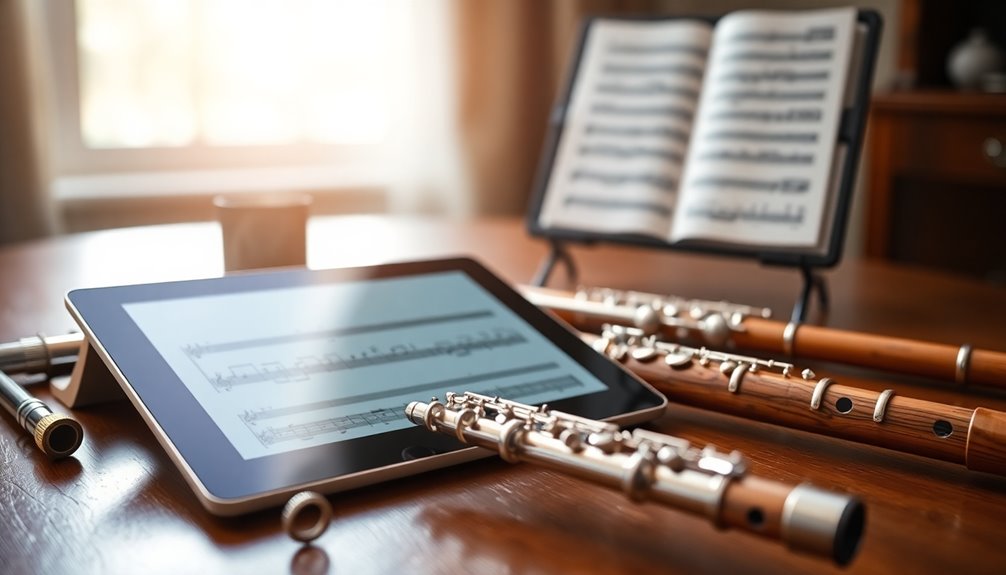
Tracing the evolution of flute composition reveals a fascinating journey shaped by cultural shifts, technological advancements, and artistic experimentation. From its ancient roots in various cultures, the flute has continually adapted to the changing musical landscape.
You can trace the historical influences that shaped its development, such as the Baroque period, where ornamentation and intricate melodies flourished. Composers like Bach and Vivaldi elevated the flute's status, showcasing its expressive potential through innovative compositional techniques.
As you investigate deeper into its evolution, you'll notice how the Classical and Romantic eras introduced new forms and structures. The rise of the symphony orchestra led to the flute being integrated into larger ensembles, which expanded its role and repertoire.
Composers such as Mozart and Debussy employed the flute to convey a range of emotions, further challenging and redefining its capabilities.
In the 20th century, the introduction of avant-garde techniques and extended tonalities pushed the boundaries of flute composition even further. You might find the exploration of multiphonics, circular breathing, and microtonality particularly intriguing, as they reflect a desire to break free from traditional constraints.
Today, as you engage with modern composers, you'll witness a blend of historical influences and contemporary practices. The flute continues to evolve, embracing new styles and idioms while maintaining its rich heritage. This journey invites you to become part of a vibrant community, where you can explore, experiment, and contribute your voice to the ever-expanding narrative of flute composition, encouraging authentic artistic expression that resonates with the emotional depth found in traditional melodies.
Key Digital Tools for Composers
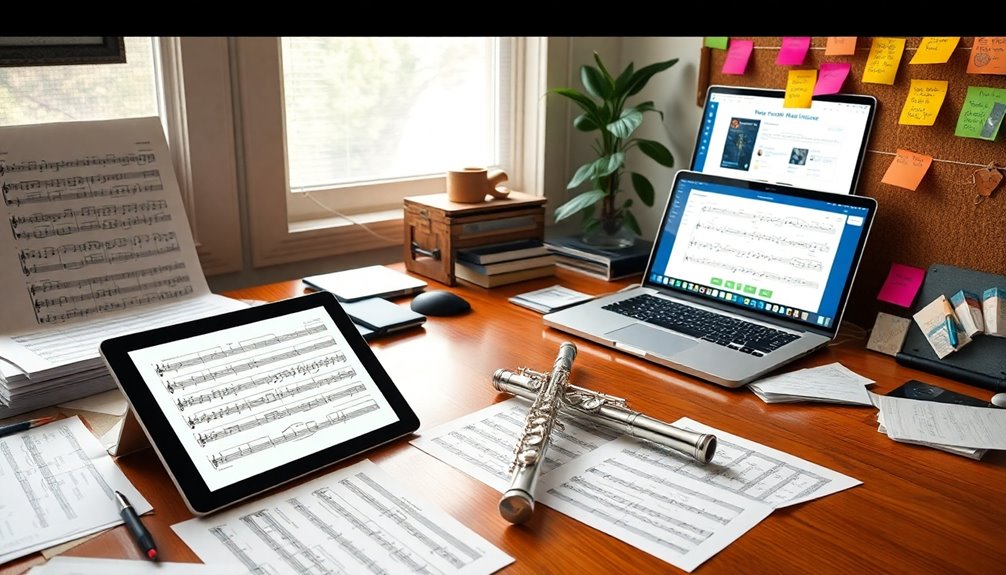
In today's digital age, composers have a wealth of innovative tools at their fingertips that can greatly enhance the creative process. Whether you're a seasoned professional or just starting out, these digital resources can transform your approach to composition.
One of the most crucial tools is music notation software, which allows you to write, edit, and share scores with ease. Programs like Sibelius and Finale not only streamline the notation process but also provide playback features, helping you hear your compositions come to life in real time.
Another crucial aspect of modern composition is sound synthesis. Digital audio workstations (DAWs) like Ableton Live and Logic Pro offer powerful sound design capabilities, enabling you to experiment with textures and timbres that were previously unattainable.
With built-in synthesizers and effects, you can manipulate sounds to create unique sonic landscapes that elevate your flute compositions. Additionally, utilizing music practice tools can help refine your skills and improve your overall compositional quality.
Incorporating these tools into your workflow doesn't just enhance your creativity; it fosters collaboration and community. Many composers now share their work online, inviting feedback and building networks of support.
Online Learning Platforms
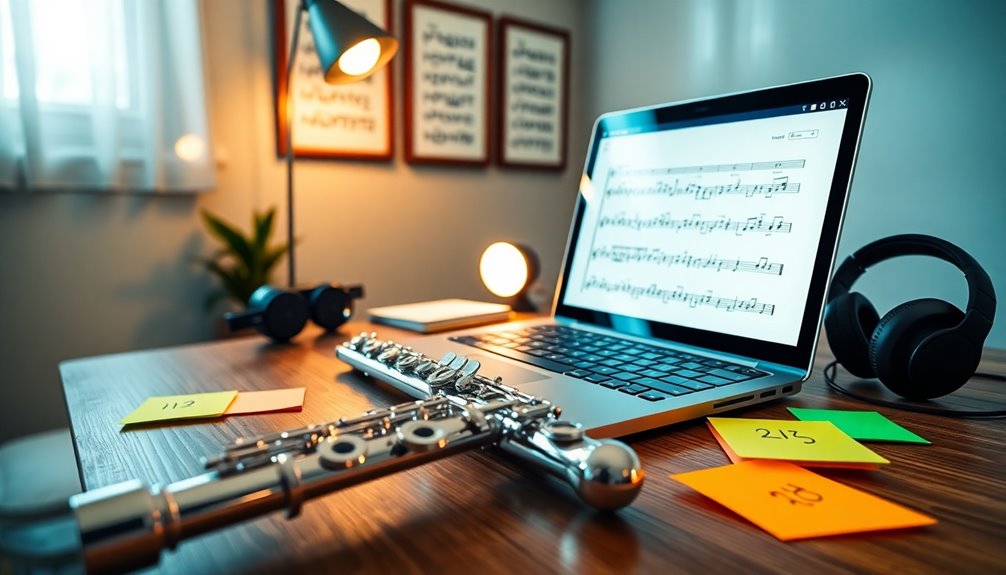
Exploring online learning platforms has revolutionized the way flute players and composers acquire new skills and knowledge. These platforms offer you a wealth of resources, from interactive lessons to community engagement, allowing you to learn at your own pace while connecting with fellow musicians. You can now plunge into specialized courses tailored to your interests, whether it's mastering the fundamentals or experimenting with contemporary compositions.
Here's a quick overview of some popular online learning platforms:
| Platform | Key Features |
|---|---|
| YouTube | Free tutorials, diverse styles |
| Udemy | Structured courses, lifetime access |
| Skillshare | Project-based learning, community feedback |
| Coursera | University-level courses, certification |
| MasterClass | Celebrity instructors, high-quality production |
These platforms not only provide you with interactive lessons, but they also foster a sense of belonging through community engagement. You can participate in forums, share your progress, and receive constructive feedback from peers and instructors alike. This collaborative environment encourages you to take risks in your composition and performance, knowing you're part of a larger musical journey. Additionally, many tutorials offer affordable options that make learning accessible for everyone.
Virtual Masterclasses and Workshops
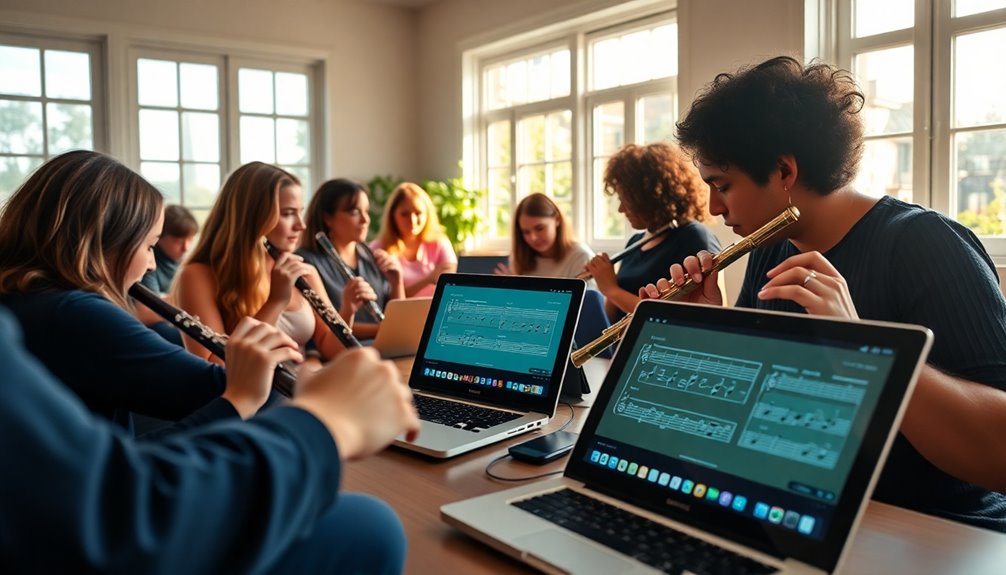
Building on the collaborative spirit fostered by online learning platforms, virtual masterclasses and workshops offer a unique opportunity for flute players and composers to engage with experts and peers in real-time. These sessions break geographical barriers, allowing you to connect with musicians from around the world, creating a rich tapestry of diverse experiences and perspectives.
In a virtual setting, you can immerse yourself in interactive discussions, receive immediate feedback, and explore innovative techniques you mightn't encounter in traditional classrooms. The digital networking inherent in these masterclasses cultivates a sense of belonging among participants. When you share your challenges and triumphs with fellow flutists, you build a community that supports your growth and creativity.
Virtual collaboration during these workshops is particularly transformative. You can participate in live demonstrations, ask questions on the spot, and watch experts dissect complex compositions, all from the comfort of your home. This immediacy fosters a dynamic learning environment where ideas flow freely, and inspiration is abundant.
Moreover, the accessibility of recorded sessions means you can revisit insightful moments, deepening your understanding at your own pace. You're not just a passive observer; you're an active participant in a global conversation about flute music. Additionally, engaging in these sessions can significantly enhance your breath control techniques, allowing you to implement what you learn in real-time performances.
Embracing these digital tools enriches your craft and helps you forge meaningful connections that could last a lifetime. So, take advantage of virtual masterclasses and workshops, and watch your skills and confidence soar.
Collaborative Composition Techniques
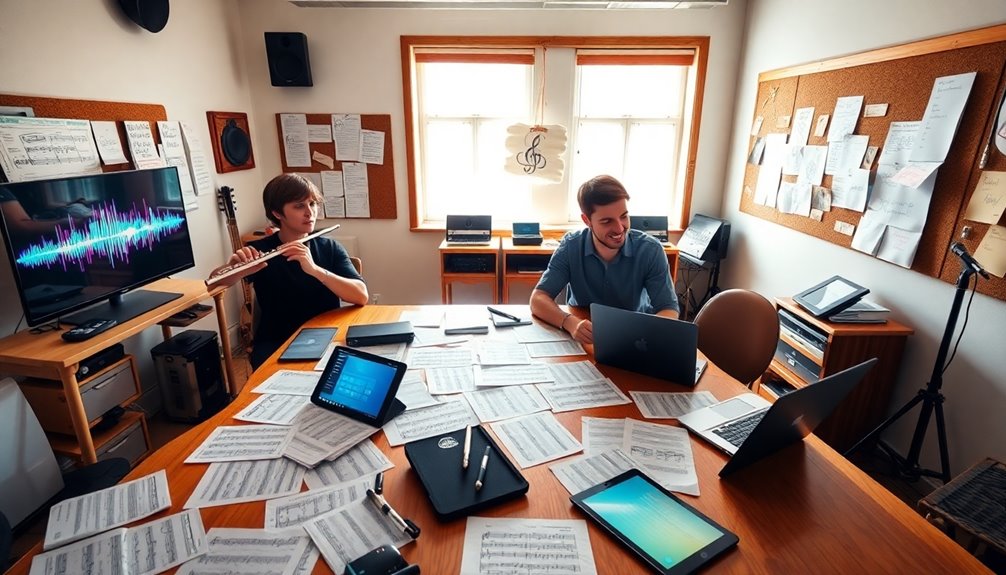
While traditional composition often emphasizes solitary creativity, collaborative composition techniques offer a revitalizing approach that can enhance your musical output. Engaging with fellow musicians through digital collaboration fosters an environment where ideas flourish and innovation thrives. You're no longer confined to your own thoughts; instead, you can tap into the diverse perspectives of others, enriching your own compositions.
One of the most exciting aspects of this collaborative approach is the emergence of remote jam sessions. These virtual gatherings allow you to connect with flutists from around the globe, sharing your progress and experimenting with new ideas. With tools like video conferencing and cloud-based platforms, you can brainstorm, compose, and share recordings in real-time. Imagine crafting a piece where each player adds their unique flair, creating a tapestry of sounds that reflects a collective spirit.
Moreover, digital collaboration encourages accountability and motivation. When you work alongside others, you're more likely to stay engaged and committed to your goals. You can provide feedback to one another, ensuring that your compositions evolve in ways you mightn't have considered alone. Additionally, the experience of collaborative practice in a supportive environment nurtures teamwork and communication, essential skills that enhance the overall creative process.
This sense of belonging to a creative community can be incredibly fulfilling, transforming the often-isolation of composition into a shared journey.
Incorporating collaborative techniques into your composition process not only enhances your skills but also deepens your connections within the flute community. Embrace the power of collaboration, and watch your creativity soar.
Mobile Apps for Practice
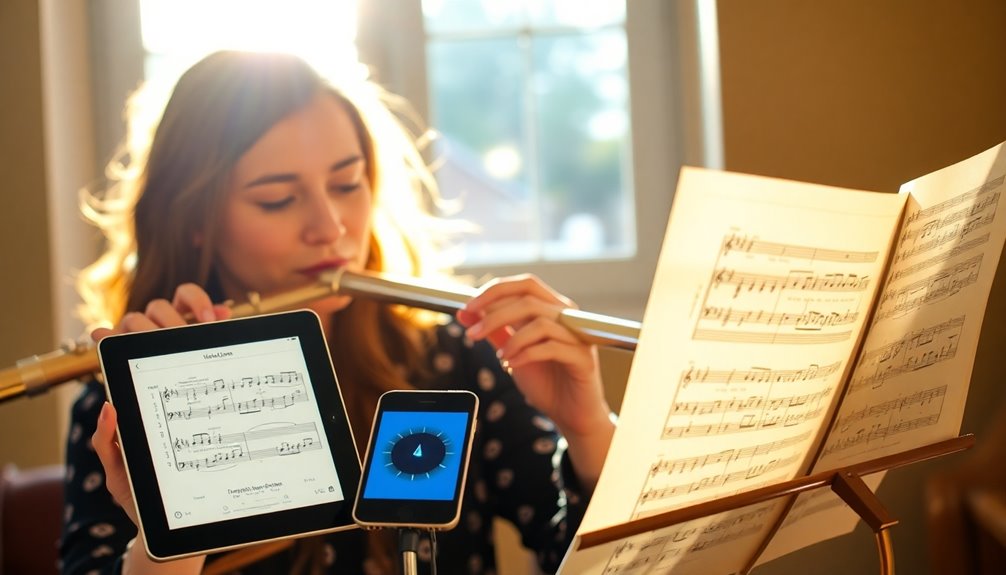
As you foster connections through collaborative composition, it's equally important to refine your individual skills, and mobile apps offer an innovative way to enhance your practice routine. These digital tools not only provide a platform for personalized learning but also create a community where you can share your progress and challenges.
One of the most significant benefits of mobile apps is their ability to facilitate practice tracking. With features that allow you to log your practice time, set goals, and monitor your improvements, these apps keep you accountable and motivated. You'll find that maintaining a consistent practice schedule becomes easier when you can visualize your progress over time.
Moreover, many apps include rhythm exercises designed to strengthen your timing and musicality. Engaging with these exercises can lead to a deeper understanding of rhythm, enabling you to apply those concepts in your compositions. As you work through various levels of difficulty, you'll notice improvements not just in your playing but also in your overall confidence.
Additionally, some apps allow you to connect with fellow flutists, sharing tips and insights while encouraging each other along the way. This sense of belonging is essential in your musical journey, as it creates a supportive environment that fosters growth. Incorporating essential flute practice tools into your routine can enhance the benefits of these mobile apps and elevate your learning experience.
Incorporating mobile apps into your practice routine can revolutionize how you approach the flute, making your learning experience more interactive and enjoyable. So, embrace these tools, and watch your skills flourish!
Enhancing Creativity With Technology
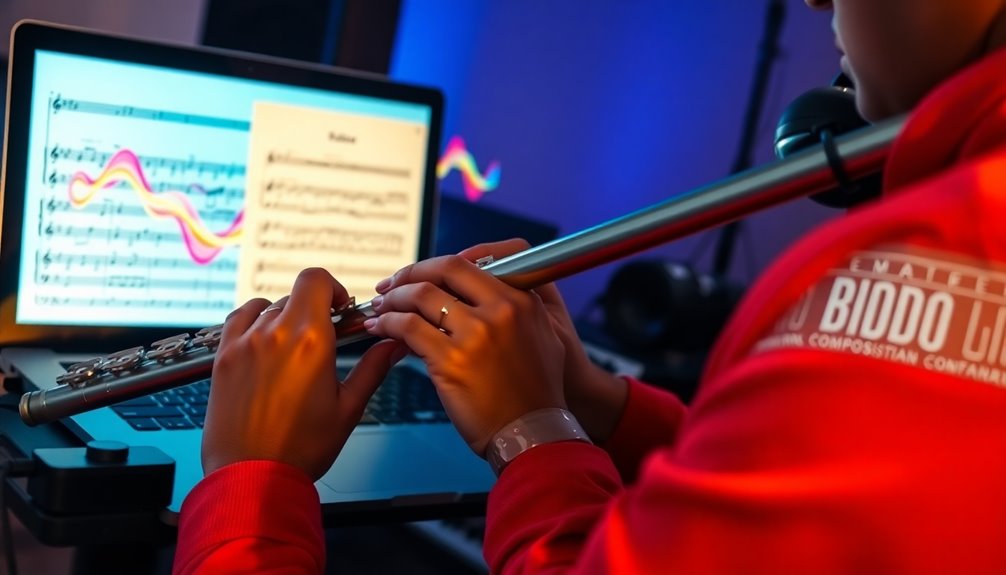
Harnessing technology can greatly enhance your creativity in flute composition, opening up a world of possibilities. With digital tools at your fingertips, you can explore new sounds, styles, and techniques that might've previously been out of reach. Digital inspiration comes not only from the vast array of online resources but also from interactive software that allows you to experiment with musical ideas instantly.
Imagine composing on a digital audio workstation (DAW) where you can layer tracks, adjust tempos, and tweak harmonies with ease. This flexibility encourages you to push boundaries, refining your unique sound.
Additionally, technology fosters creative collaboration—connecting you with fellow musicians and composers across the globe. Online platforms enable you to share your work, receive feedback, and engage in joint projects, enriching your artistic journey.
As you collaborate with others, you'll find that diverse perspectives can spark new ideas. You might discover innovative ways to incorporate different genres or techniques into your flute compositions.
Utilizing social media, you can join communities of like-minded artists who share your passion for flute music, providing you with ongoing support and inspiration. Moreover, the emphasis on daily practice habits in flute learning ensures that your skills are continually improving as you explore new creative avenues.
Ultimately, by embracing technology in your creative process, you're not just enhancing your skills; you're also building a sense of belonging in a vibrant musical community. As you navigate through this digital landscape, you'll find that your creativity flourishes, leading you to exciting new horizons in flute composition.
Future Trends in Music Education
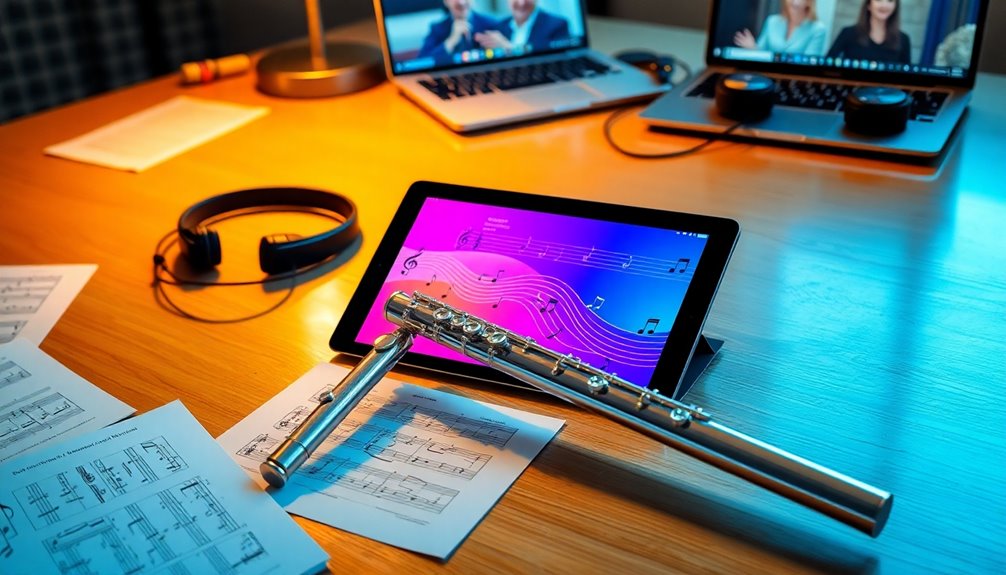
How will the future of music education evolve with the rapid advance of technology? As you navigate this exciting landscape, you'll discover that digital tools aren't just enhancements—they're fundamentally reshaping how you learn and create music.
One of the most promising trends is adaptive learning, which tailors educational experiences to your individual needs and progress. This personalized approach guarantees that you're always challenged but never overwhelmed, fostering a deeper understanding of music theory and composition. Incorporating basic flute features into online lessons can enhance your technical skills while using digital tools.
Moreover, gamified assessments are transforming traditional evaluation methods, making learning more engaging and fun. Instead of conventional tests, imagine scoring points for mastering techniques or completing creative challenges. This shift won't only motivate you but also create a more collaborative environment among peers.
Here are some future trends to watch for:
- Virtual Reality (VR) Experiences: Immerse yourself in interactive environments where you can practice alongside virtual musicians.
- AI Composition Tools: Collaborate with algorithms that assist you in composing original pieces.
- Online Communities: Connect with fellow musicians across the globe for feedback and inspiration.
- Integrated Learning Platforms: Access all your resources—lessons, sheet music, and practice tools—on a single platform.
As music education evolves, you'll find more opportunities to express yourself and connect with others who share your passion. Embrace these innovations, and let them guide your journey through the vibrant world of music.
Frequently Asked Questions
Can Digital Tools Replace Traditional Flute Teaching Methods?
Can digital tools replace traditional flute teaching methods?
While they can't fully replace the human touch and personal connection of traditional methods, they offer significant digital advantages. You can access a wealth of resources and interactive lessons that traditional methods might lack.
These tools foster creativity and adaptability, enabling you to explore new techniques and styles. Embracing both approaches can enrich your learning experience, creating a more well-rounded and engaging journey in flute mastery.
How Do I Choose the Right Software for Flute Composition?
Choosing the right software for flute composition involves evaluating the composition features you need and ensuring software compatibility with your devices.
Consider what tools enhance your creativity, like intuitive interfaces, notation options, or playback capabilities.
Explore user reviews from fellow flutists to gauge community support.
Ultimately, select a program that resonates with your style and fosters a sense of belonging in your musical journey, making the composition process enjoyable and fulfilling.
Are There Free Resources for Learning Flute Online?
Absolutely, you've got plenty of free resources for learning flute online!
Check out video tutorials on platforms like YouTube, where experienced flutists share techniques and tips. Websites often offer free sheet music, allowing you to practice a variety of pieces.
Engaging with online communities can also provide support and a sense of belonging. Immerse yourself in these resources, and you'll find that learning flute can be both enjoyable and accessible!
What Are the Best Microphones for Recording Flute Digitally?
Imagine a painter choosing brushes; the right tools can transform a masterpiece.
When recording flute, consider condenser microphones for their sensitivity and clarity, capturing every nuance. Dynamic microphones, on the other hand, excel in louder environments, providing durability and reliability.
Each has its place in your sonic palette. By selecting the best mic, you'll create recordings that resonate, inviting listeners into your unique musical journey.
Your sound deserves to be heard beautifully!
How Can I Promote My Flute Compositions Online?
Promoting your flute compositions online can be a game-changer for reaching a wider audience.
Start by sharing your work on social media platforms, engaging with fellow musicians and enthusiasts.
Consider writing guest posts for composition blogs to showcase your unique style and insights.
Create enchanting content that resonates with your audience, fostering a sense of belonging and connection.
Conclusion
As you explore the intersection of digital tools and flute composition, consider this: over 70% of music educators now integrate technology into their teaching methods. This shift not only enhances creativity but also makes learning more accessible and engaging. By embracing these innovations, you're not just keeping up with trends; you're expanding your artistic horizons. The future of flute composition and learning is bright, and with the right tools, you can truly elevate your musical journey.





